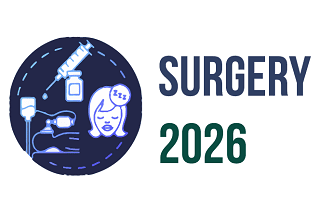4th International Conference on
Surgery and Anesthesia
November 26-27, 2026 | Dubai, UAE

Address: Al Barsha, Al Barsha 1, Dubai, United Arab Emirates
Surgery 2026

Rowan-Virtua School of Osteopathic Medicine, USA
Abstract:
This analysis assesses disparities in predicted postoperative outcomes for isolated coronary artery bypass grafting (CABG) surgery using the Society of Thoracic Surgeons (STS) Short-term/Operative Risk Calculator. Predictions are modeled on a ‘control’ patient: a 60-year-old undergoing their first cardiovascular surgery, with urgent status, three-vessel coronary artery disease, and no comorbidities. The variables examined include sex, race, and insurance status (Medicaid vs. commercial insurance). Two primary risk metrics are evaluated: combined morbidity and mortality, and the probability of a prolonged hospital stay (defined as exceeding 14 days). Findings indicate that Medicaid-covered patients consistently face higher projected risks of morbidity, mortality, and extended hospital stays compared to those with commercial insurance, across all demographic subgroups. These disparities suggest a need for further investigation into systemic and institutional factors contributing to such inequities. For instance, the association between Medicaid coverage and prolonged hospitalization may be partially driven by financial incentives tied to extended inpatient care, potentially at the expense of increased patient exposure to hospital-acquired infections. Additionally, female patients demonstrate higher projected morbidity and mortality risks than their male counterparts of the same race, independent of insurance status. The most vulnerable subgroup identified comprises Asian and Black/African American females with Medicaid coverage. These results underscore the impact of intersecting demographic and socioeconomic variables on surgical risk profiles and highlight the urgent need for equity-centered approaches in preoperative risk assessment and healthcare delivery.
Biography:
Angelina Siino is a 3rd year medical student at Rowan-Virtua School of Osteopathic Medicine and undergraduate alumni of Tulane University of Louisiana.
